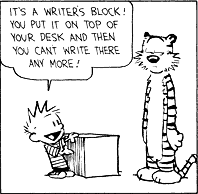Education
Writer's Block

Writer's block... A term we've all heard of and most of us have struggled with. In this December edition of Aspire we aim to tell you all about what it is, how and why it happens and how to combat it. If you didn't quite manage to complete NaNoWriMo last month, or just feel exhausted and like giving up after such a huge task, this article aims to help you push through it and get back on track. Writing doesn't stop after NaNo, after all!
"Writer's block is a condition, primarily associated with writing, in which an author loses the ability to produce new work, or experiences a creative slowdown. The condition ranges from difficulty in coming up with original ideas to being unable to produce a work for years. Throughout history, writer's block has been a documented problem." – Wikipedia
As Wikipedia states, writer's block has been around for centuries. It is a very common thing among authors, and it can be incredibly bothersome. In the worst cases it can stop you from writing the novel you used to be so passionate about!

But really, when you think about it, writer's block is just in our head. It is simply a form of procrastination – a very stubborn form. We can't think of the next words for our story and so we justify doing other things. Or we just sit there, staring at the blank page, delaying our writing to a later time.
Procrastination, as you'll probably know, is where we put things off and save them for later, either intentionally or habitually. Instead of doing what you're meant to do, which in this case would be writing, you find yourself doing trivial things instead, like browsing the internet or checking your social media. Procrastination is what happens when you have a writer's block: you're finding it so difficult to continue writing, for whatever reason, that you keep doing other things instead.
Why do we do this to ourselves? One of the reasons you might procrastinate is when you run out of inspiration. Many authors are very excited about their story idea when they first come up with it. Over time, this excitement decreases, sometimes so much that they don't know how to continue it.
Perfectionism is another one. Many writers struggle to write a difficult scene because they think their writing will be bad. This is a very strong vicious cycle and can bring you down so quickly.
Sometimes authors get distracted by other events. This can be other writing projects, other projects entirely, or just friends and family.
And other times we just don't have time to write or don't feel like writing for an extended period of time. This can be caused by circumstances in life, like an illness, major life events, financial pressure or other kinds of stress.

Procrastination is what we want to combat, because writer's block can make it so that you'll never finish your story! How do we do that? Well, luckily for us, the internet is full of remedies against writer's block. You just have to find what works for you. Here are some of the best ideas we have found around. Try them out and let us know what works best for you!
1. Firstly, and probably most importantly: give yourself permission to write badly. One of the best writing quotes around is this one by C.J. Cherryh: "It is perfectly okay to write garbage – as long as you edit brilliantly." When you are stuck on a story, it is often because you are afraid to write the scene badly. But that's okay. You just need to get that scene into words first, then you can edit it to your heart's content later. After all, you can't edit a blank page.
2. Free-writing: writing without rules or limits. Set a timer of 10 minutes and just write down all the words that come to you, whatever they are. Don't look back to see what you've written before, just write. After the timer goes off, your creative juices are flowing and you might find it easier to get back to your story. Do this as many times, or as long, as you need.
3. Go for a walk or a run. Exercise, warming up the body, is a good way to warm up the brain as well. Exercise gives you new energy and with that, hopefully, new ideas. An added bonus: while being outside, you might see something that jogs an idea in your head.
4. Read a book, watch a movie or play a game. All of these have the same aim: they distract you from the story you are currently working on and move your attention to an entirely different story. This might give you a new viewpoint on your own story, boost your motivation to create something amazing, or give you a new idea for the scene you're stuck on.
5. Focus on something small. Usually, when you're stuck on your story, it feels like the entire story sucks and you don't even know what the plot is supposed to be anymore. In those cases it can help to view the story not as one giant plotline, but as lots of little pieces; scenes. Tell yourself not to write the story, but to simply write this particular scene. Don't allow yourself to look at the bigger picture until this scene is written down.
6. Change your environment. Sometimes when you get stuck, it helps to have a change of scenery. Take your laptop (or notebook) and go outside. Write in the park, a café, a nearby forest, or just in your backyard. It'll help you look at the scene with a fresh set of eyes.
7. Write about what you're going through right now; how you're feeling because of this writer's block. Sometimes it helps to just get writing again. Because, as Charles Bukowski said, "Writing about a writer's block is better than not writing at all."
8. Eliminate distractions. This one should probably be higher up on the list, to be honest. Shut down Facebook, Instagram, Twitter, heck even Wattpad. Make sure there isn't too much clutter on your desk. Make sure there aren't any distracting noises, put on some headphones with classical music if you need. Anything to get rid of those horrible distractions.
9. Create a routine. This could be certain things you always do before you start writing, like listening to a certain song, going for a walk, read for ten minutes before you start writing. Anything to get those creative juices flowing. Whatever works for you. Or it could be writing for an hour everyday, or even better: at the same time of every day. Most famous writers have routines like this. Google your favourite author to see what their routine is. (Or better yet: don't. That's called procrastination. Have we taught you nothing?!)
10. Give it time. While we think about other things, our subconscious still works through the problems we've stumbled across. Your next scene is such a problem. Sometimes when you're stuck, all you need is to focus on other things for a couple of days and the solution will come to you.
These were our top tips for authors with a writer's block. Have any of these helped you get you back on track? Let us know in the comments!
Naomi - NDeMeer
Team Of Dreams
Bạn đang đọc truyện trên: AzTruyen.Top